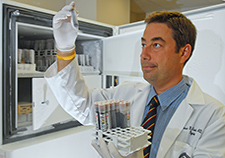Office of Research & Development |
 |

VA Research Currents archive
August 26, 2015

Dr. Alexander B. Niculescu, with VA and Indiana University, is studying blood biomarkers and questionnaires that can accurately predict suicide attempts. (Photo courtesy of Indiana University)
Researchers with VA and Indiana University School of Medicine have developed blood tests and questionnaires that can predict with more than 90 percent accuracy which mental health patients will begin thinking of suicide, or attempt it.
The findings appeared online Aug. 18, 2015, in the journal Molecular Psychiatry.
"We believe that widespread adoption of risk-prediction tests based on these findings during health care assessments will enable clinicians to intervene with lifestyle changes or treatments that can save lives," said Dr. Alexander B. Niculescu III, professor of psychiatry and medical neuroscience at the IU School of Medicine, and attending psychiatrist and research and development investigator at the Richard L. Roudebush VA Medical Center.
Using RNA biomarkers from blood samples along with newly developed questionnaires in the form of an app, the researchers were able to predict which individuals in a group of patients being seen for a variety of psychiatric illnesses would experience significant suicidal ideation with approximately 92 percent accuracy. Among patients with bipolar disorder, the accuracy reached 98 percent, Niculescu said. The combination of biomarkers and app was also accurate in predicting which of the patients would be hospitalized for suicidality in the year following testing (71 percent across all diagnoses, 94 percent for bipolar disorder).
The questionnaires by themselves, implemented as apps on tablets, were able to predict the onset of significant suicidal thoughts with more than 80 percent accuracy.
The research expands on work reported by Niculescu and colleagues in 2013 in which they identified a panel of biomarkers that were significantly elevated in bipolar disorder patients with suicidal thoughts or who were hospitalized as a result of suicide attempts.
"We now have developed a better panel of biomarkers that are predictive across several psychiatric diagnoses. Combined with the apps, we have a broader spectrum predictor for suicidality," Niculescu said. "In additional to reproducing and expanding our own previous work, we reproduce and expand other groups' results in this burgeoning field."
The new study began with 217 male psychiatric participants, followed by Niculescu and colleagues for several years. The participants all had a diagnosis of bipolar disorder, major depressive disorder, schizoaffective disorder, or schizophrenia. The researchers identified 37 of the men who switched from no suicidal ideation to high suicidal ideation at different testing visits. The scientists identified RNAs that were present at different levels in blood samples taken at those different testing visits, and that were found in all of the 37 individual patients.
Next, working with the local coroner's office, the researchers validated a set of prioritized biomarkers using blood samples from 26 men who had actually committed suicide.
Finally, the researchers used blood samples and medical records from a different group of patients with the same psychiatric diagnoses to confirm that the biomarkers and apps predicted suicidal ideation.
The team also examined their ability to predict future hospitalizations for suicidality in the first year following testing.
The app-based questionnaires were developed separately, said Niculescu. One of the apps assesses measures of mood and anxiety; the other asks questions related to life issues including physical and mental health, addictions, cultural factors and environmental stress. Neither app, he emphasized, asks whether the individual is thinking of committing suicide.
Niculescu said he believes the apps are ready to be deployed and tested by medical professionals, particularly in emergency department settings. The biomarkers could also be more widely tested for in the near future he said.
However, he noted two limitations that require additional research. First, all of the participants in this study were men. Studies in women are currently being conducted and are showing promising preliminary results. In addition, the research was based on people with psychiatric diagnoses. How well the biomarkers would work among those who have not been diagnosed with a psychiatric disease is not known.
Adapted from an Indiana University news release